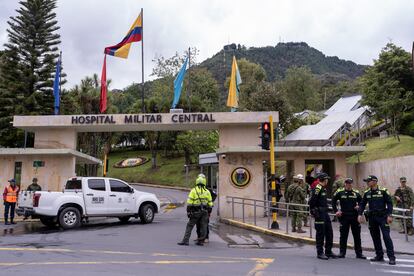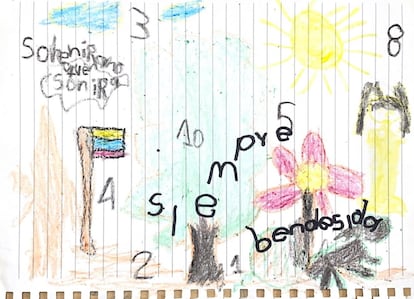Rescued children offer clues about 40 days of survival in Colombia jungle
Lesly, the eldest of the four siblings, used several objects she found in the plane wreckage to improvise a shelter for herself, Soleiny, Tien and Cristin

The four indigenous children rescued on Friday in the Colombian jungle have spent the last few days at the Military Hospital in Bogotá. The director of the Colombian Institute for Family Welfare (ICBF), Astrid Cáceres, said on Blu Radio on Monday that they are recovering and can now eat cassava, as they had requested from the beginning. They are drawing and reading and remain under the care of relatives of their mother — who died in the plane crash in the Guaviare region on May 1 — and an ICBF representative. Meanwhile, members of the indigenous community have reported that various items helped the children survive for 40 days in the jungle, including two cell phones, a flashlight, a music box and a soda bottle.
Four indigenous men who participated in a joint operation with the military were the ones who found Lesly Mucutuy (13), Soleiny Mucutuy (9), Tien Noriel Ronoque Mucutuy (5) and Cristin Neriman Ranoque Mucutuy, who turned one in the jungle. Nicolás Ordóñez spotted them among the vegetation after hearing the baby crying. “We are family, we were sent by your father, your grandmother,” he told them, according to a video circulating on social media. “I’m hungry, I’m very hungry,” Lesly replied. A few steps further away, rescuers found Tien lying down and having difficulty walking. “My mom died,” he told them.
Henry Guerrero, in charge of conveying the news to the family, told Caracol Television on Sunday that the siblings used various objects they found in the wreckage after the small aircraft they were traveling in with their mother and two other adults suffered an engine failure and crashed on its way to San José del Guaviare. They had some tarpaulin, a towel, two cell phones without battery, a flashlight and an empty soda bottle, which they filled with water from the river. “When they crashed, the first thing that came to [Lesly’s] mind was how to use that to survive,” said the indigenous leader. They always stayed near the river to stay hydrated and took advantage of the food that was on the plane.
The community explained that the children found one of the emergency supply packages that the military dropped in the area. They also said that they received one of the brochures written in Spanish and Uitoto and that they heard the voice of their grandmother, in a recording played through loudspeakers, asking them to stay still. They had no visible injuries, save for a cut healing on Lesly’s head. Their clothes were in tatters after so many days enduring the constant rain of the jungle.
The children’s maternal grandfather, Narciso Mucutuy, said in information released on Monday by the Ministry of Defense that Lesly took her siblings out of the plane and found clothes in their deceased mother’s suitcase. The grandchildren spent the first four days near the plane and ate fariña (a cassava flour) that one of the deceased had packed for the trip. Later, after days in which no one showed up, they began to move away from the aircraft: “When they saw that four days had passed, they took the trail to the mountains. She [Lesly] said she didn’t know where she was going to go.”
The children walked for days, until exhaustion prevented them from continuing. “She could no longer walk, she was already very tired, very tired. So they huddled in one place and sat down. She had the little girl between her legs when they found them,” Narciso said. According to the grandfather, the grandchildren were not afraid of the jungle and coped with the rain without trouble. “They took twigs, large leaves and took cover underneath,” he said.
Lesly told her grandfather that they only felt scared when they heard the sound of the helicopters and when they saw the rescuers a few steps away. They thought they were going to be punished for hiding: “They never answered, they thought that if they were found they would be beaten.”
The siblings now want to know what happened to Wilson, a rescue dog that found them and walked with them on several occasions but is now missing. Over the weekend, Lesly and Soleiny delivered some drawings to the commander of the Military Forces, Helder Giraldo, so that Wilson will know, when they find him, that they have been thinking of him all this time. “Always blessed,” reads a drawing of the dog that also has a flower, a sun and a Colombian flag. “Wilson,” reads another drawing in which the dog is next to some trees.

The director of the ICBF said that a member of her organization has been placed in charge of the children while a dispute between the father of the two youngest siblings and the maternal family is resolved. According to this official, the grandparents have asked the ICBF to be present, and the institute is evaluating various options for the siblings once they leave the hospital. “The children are going to stay in the best place, somewhere where we can protect them [...] they have our full attention because they represent a very particular story,” Cáceres said on Blu Radio. “We cannot make mistakes in our decision-making.”
A spokeswoman for the ICBF added on Monday afternoon that the children are doing well. “They are in a very good mood, they have been coloring, drawing. They love to talk, they have been interacting with books. They are very willing to be in this hospital environment.” The Institute has established a coordination team with the National Organization of the Indigenous Peoples of the Colombian Amazon (OPIAC) so that any measures that are taken “are consistent with their culture and ethnicity.”
Sign up for our weekly newsletter to get more English-language news coverage from EL PAÍS USA Edition
Tu suscripción se está usando en otro dispositivo
¿Quieres añadir otro usuario a tu suscripción?
Si continúas leyendo en este dispositivo, no se podrá leer en el otro.
FlechaTu suscripción se está usando en otro dispositivo y solo puedes acceder a EL PAÍS desde un dispositivo a la vez.
Si quieres compartir tu cuenta, cambia tu suscripción a la modalidad Premium, así podrás añadir otro usuario. Cada uno accederá con su propia cuenta de email, lo que os permitirá personalizar vuestra experiencia en EL PAÍS.
¿Tienes una suscripción de empresa? Accede aquí para contratar más cuentas.
En el caso de no saber quién está usando tu cuenta, te recomendamos cambiar tu contraseña aquí.
Si decides continuar compartiendo tu cuenta, este mensaje se mostrará en tu dispositivo y en el de la otra persona que está usando tu cuenta de forma indefinida, afectando a tu experiencia de lectura. Puedes consultar aquí los términos y condiciones de la suscripción digital.









































